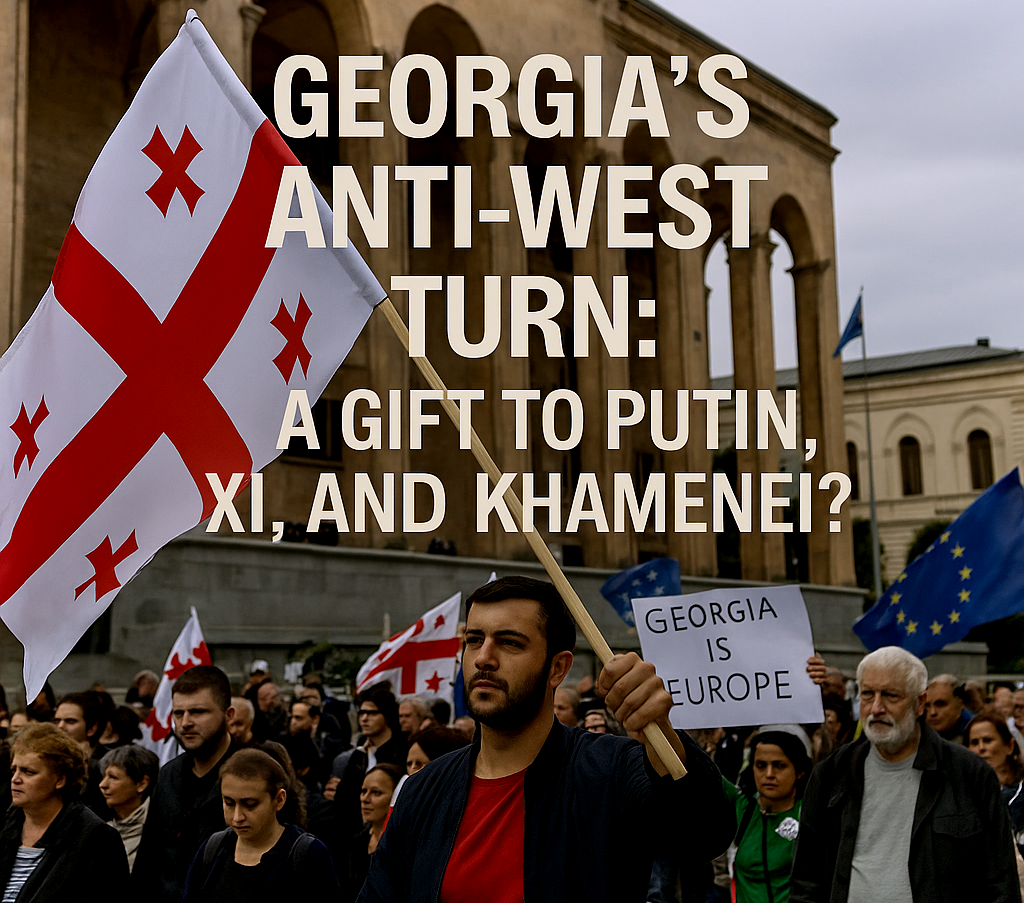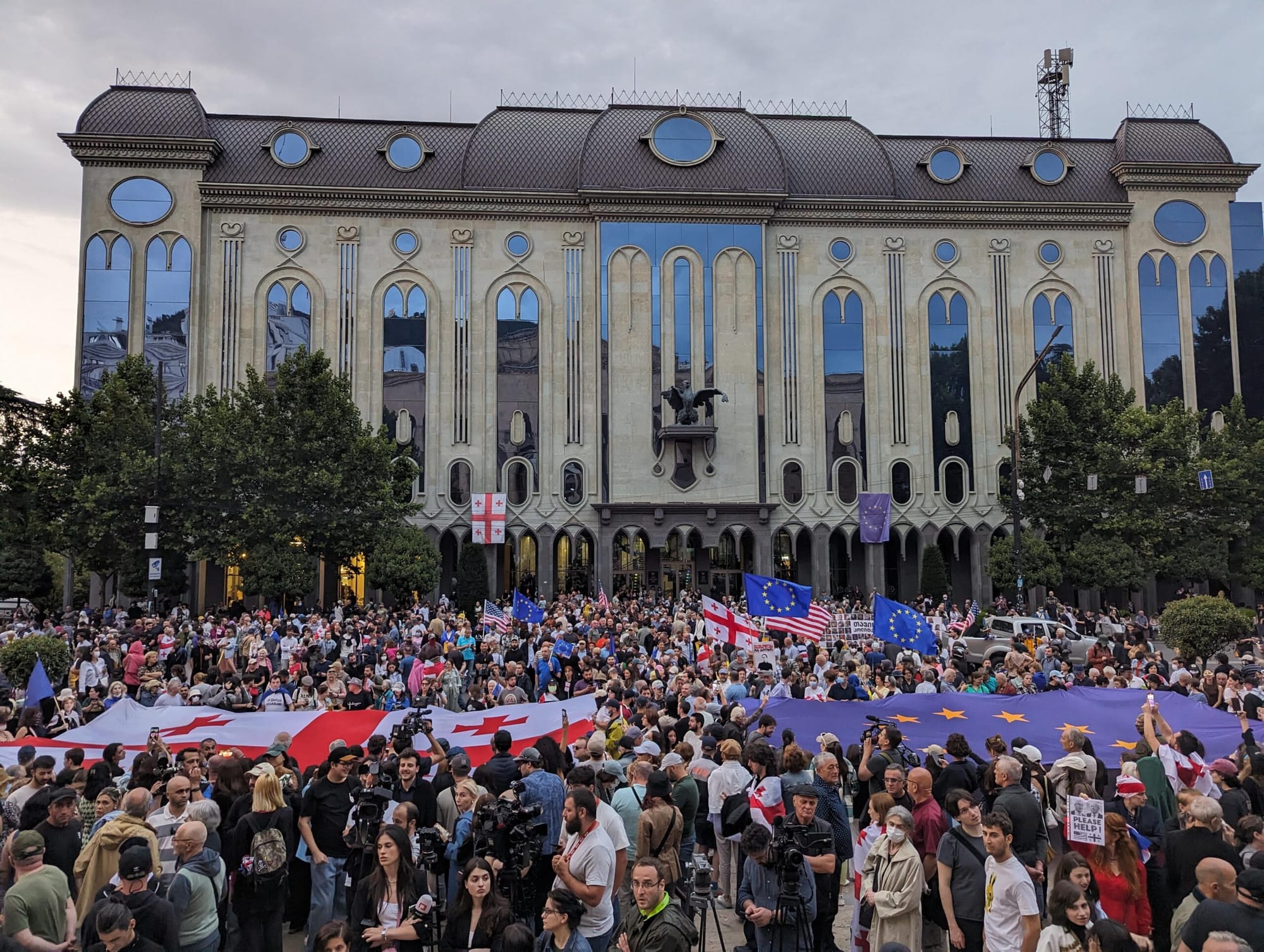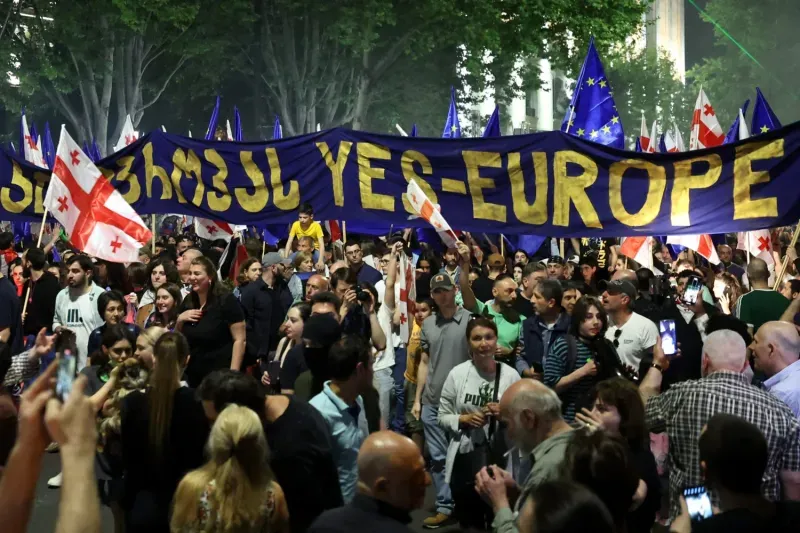Democracy Under Siege: How Georgia’s Crisis Opens the Door for Russia, China, and Iran
Explore Georgia’s democratic backsliding and how Russia, China, and Iran are exploiting the power vacuum through media, trade, and diplomacy, with global implications.

TBILISI, July 17, 2025
Democracy at the Brink
Georgia, once seen as a successful post-Soviet democracy, now risks falling into authoritarian rule. As democratic standards weaken and EU talks stall, a geopolitical void has formed. Russia, China, and Iran are eager to step in. This situation is about more than just Georgia; it represents a critical point in a worldwide clash between democratic values and authoritarian influence.
The Unraveling of Democratic Institutions
Since late 2023, Georgia's ruling Georgian Dream party has been quietly dismantling important democratic protections. Their “foreign agents” law, similar to those in Russia, requires NGOs and media with over 20% foreign funding to register and face intrusive audits. Critics warned from the start that this bill aims to silence dissent. The law passed its final reading in May 2024 with a vote of 84 to 30. Although President Zourabichvili temporarily vetoed it, later amendments made it a felony to protest. More than 700 civil servants lost their jobs for supporting the protests.
Independent observers have noted numerous irregularities in the 2024 parliamentary election, suggesting that about 175,000 votes may have been tampered with. Key figures in Georgia's legal community, including constitutional expert Vakhtang Khmaladze, labeled the process illegitimate and unconstitutional.
The Strategic Vacuum & Regional Theater
As Georgia's ties to the EU and NATO weaken, its geopolitical significance is growing—for the wrong reasons. Twenty percent of its territory is still occupied by Russian forces in Abkhazia and South Ossetia. With this backdrop, Russia, China, and Iran are positioning themselves to shape Georgia's future.
Russia: Military Shadow & Disinformation Matrix
Russian forces retain control over breakaway regions while Moscow has initiated a media campaign, spreading pro-Kremlin stories through Georgian outlets. Authorities have also adopted Russian-style surveillance by installing Chinese-made facial-recognition systems to identify protesters. These actions both tighten control and send a warning to potential dissenters.
China: Economic Leverage Through Infrastructure & Tech
Chinese companies have quickly increased their presence through the Belt and Road Initiative, investing in the “Middle Corridor” rail and telecom infrastructure. Huawei has secured telecom contracts amid parliamentary turmoil, tying Georgia into a web of digital reliance. Today, China is one of Georgia’s top trading partners while Georgian oligarchs chase lucrative infrastructure deals for political backing.
Iran: Sanctions-Busting & Strategic Co-optation
The Iranian Revolutionary Guards Corps is quietly inserted into Georgia's energy and border-monitoring sectors, providing surveillance technology and alternative financial mechanisms to assist Tbilisi in escaping Western sanctions. As Georgia veers away from its Euro-Atlantic path, Iran sees an opportunity for soft-power expansion.

A Microcosm of Great-Power Competition
The South Caucasus, home to Georgia, Armenia, and Azerbaijan, is quickly becoming a geopolitical battleground. Georgia was once a model of liberal reforms, gaining EU candidate status in 2023. However, the ongoing violations of democratic standards have led Brussels to freeze its accession progress.
Currently, Georgia is a testing ground for the authoritarian influence that Western democracies once condemned. The West’s slow response may signal a strategic retreat, allowing Russia, China, and Iran to strengthen their foothold not only here but in Moldova, the Balkans, and Central Asia.
Dissecting the Authoritarian Playbook
Georgia is undergoing a typical authoritarian takeover:
- Media encroachment: Outlets are being controlled by pro-government oligarchs, while disinformation campaigns repeat Kremlin narratives.
- Economic dependencies: Support from Russia, China, and Iran comes with strings attached.
- Legal authoritarianism: Strict administrative measures now punish protest and offense, masked as national security actions.
- Security partnerships: Iran’s border technology and Russia’s military presence reinforce compliance through coercion.
These tactics resemble those used in Hungary under Orbán, Belarus under Lukashenko, and Serbia under Vučić. Georgia is essentially a testing ground where these authoritarian strategies are being refined.

Why This Matters to NATO and the World
Georgia shares a direct border with NATO member Turkey. As democracy deteriorates at NATO's edge, the alliance faces pressing issues. A destabilized Georgia could allow Russia to maneuver more freely in the Black Sea and create a broader authoritarian corridor towards Central Asia.
Legislative actions in allied countries, such as the U.S. Megobari Act, aim to impose sanctions on Georgian officials and oligarchs involved in anti-democratic activities. British and EU foreign ministers have strongly condemned the situation, with some advocating for visa bans and asset freezes. Yet, collective action remains insufficient.
Civic Resistance: A Last Stand for Democracy
Despite state pressure, civic movements in Georgia are gaining strength. Youth-led protests continue on Rustaveli Avenue, NGOs and clergy are speaking out, and President Zourabichvili has introduced a pro-democracy “Georgian Charter.”
Protesters wave EU flags, chanting, “Georgia Belongs to Europe.” However, exhaustion and government repression—including detentions and legal retaliation—are diminishing their momentum. Their message is clear: the West must act quickly.

Lessons & Global Implications
Georgia's decline is not just a regional setback; it highlights a global trend where democracies crumble from within. Leaders are exploiting democratic institutions worldwide, from Argentina to Poland to Kenya, to consolidate power. Georgia illustrates how quickly a democratic collapse can become routine until the last remnants of legitimacy are propped up by wealthy elites and foreign authoritarians.
Final Verdict: Rewriting the Stakes
Georgia is no longer just charting its political fate. It has become a crucial point in a global struggle between democratic resilience and authoritarian ambition.
If the West fails to reaffirm its values and offer support, allowing delays in sanctions or letting disinformation flourish, it could pave the way for Russia, China, and Iran to reshape international relations.
Georgia today, Moldova tomorrow. Slovakia could be next. The dominoes are in place.
Questions Worth Asking
Should NATO consider a permanent mission in Georgia to deter Russian aggression?
Could Western-funded civil society in Georgia act as a safeguard against authoritarian takeover? Is it practical to block aid unless democratic standards are upheld?
Can Georgia find a non-aligned path that still upholds democratic governance?
Sources
- Human Rights Watch, “Dark Day for Georgia’s Democracy” (The Times+3Human Rights Watch+3Vox+3Caucasus Edition+1Wikipedia+1)
- CFR, “What Georgia’s Foreign Agent Law Means…” (Human Rights Watch+10Council on Foreign Relations+10Chatham House+10)
- Eurasia Daily Monitor, “Ongoing Civil Protests…” (Jamestown+1Jamestown+1)
- Atlantic Council, “To Help Georgians…” (Civil Georgia+15Atlantic Council+15Atlantic Council+15)
- Reuters, “Georgia fired 700 civil servants” (Vox+14Reuters+14The Times+14)
- AP News, “Germany, France and Poland condemn violence”(AP News+1Le Monde.fr+1)
- The Times, “Crackdown in Georgia…” (The Times)
- JamNews
- Getty Images
- Reuters/CNN




